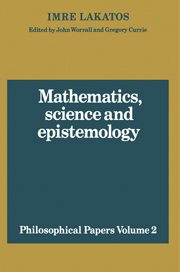Book contents
- Frontmatter
- Contents
- Editors' introduction
- PART 1 PHILOSOPHY OF MATHEMATICS
- PART 2 CRITICAL PAPERS
- 6 The problem of appraising scientific theories: three approaches
- 7 Necessity, Kneale and Popper
- 8 Changes in the problem of inductive logic
- 9 On Popperian historiography
- 10 Anomalies versus ‘crucial experiments’ (a rejoinder to Professor Grünbaum)
- 11 Understanding Toulmin
- PART 3 SCIENCE AND EDUCATION
- References
- Lakatos bibliography
- Indexes
10 - Anomalies versus ‘crucial experiments’ (a rejoinder to Professor Grünbaum)
Published online by Cambridge University Press: 09 January 2010
- Frontmatter
- Contents
- Editors' introduction
- PART 1 PHILOSOPHY OF MATHEMATICS
- PART 2 CRITICAL PAPERS
- 6 The problem of appraising scientific theories: three approaches
- 7 Necessity, Kneale and Popper
- 8 Changes in the problem of inductive logic
- 9 On Popperian historiography
- 10 Anomalies versus ‘crucial experiments’ (a rejoinder to Professor Grünbaum)
- 11 Understanding Toulmin
- PART 3 SCIENCE AND EDUCATION
- References
- Lakatos bibliography
- Indexes
Summary
INTRODUCTION
I am grateful for Professor Grünbaum's criticism of the ‘antifalsificationist’ features of my methodology of scientific research programmes, and I am glad to have the opportunity to reply. I have to start by trying to clarify a basic misunderstanding. My paper opened with the question: ‘Exactly how and what do we learn about scientific theories from experiment?’ Later I made what Grünbaum called my ‘provocative claim’ that ‘we cannot learn from experience the falsehood of any [scientific] theory’. Now if one interprets ‘theory’ as ‘proposition (fallibly) mirroring a fact’, then because of the (epistemologically unbridgeable) gap between fact and proposition my claim is far from being provocative: it is an orthodox common-place. It says that if crucial experiments are to provide experimental disproof, there can be no crucial experiments. If I have a provocative claim, that claim is a stronger one; namely that no experimental result, in isolation, can ever defeat a ‘theory’, whether in my sense (that further work on it is irrational) or in Grünbaum's sense (that the experiment should change our rational belief into rational disbelief). That is, there are no ‘crucial experiments’ even in either of these two weaker senses.
THERE HAVE BEEN NO CRUCIAL EXPERIMENTS IN SCIENCE
I explained and elaborated my negative position concerning ‘crucial experiments’ in several papers between 1968 and 1971, and I tried to put it in a nutshell (admittedly with the aid of dozens of back references) at our Penn symposium. In my view, in science we do not learn simply from conjectures and refutations.
- Type
- Chapter
- Information
- Mathematics, Science and Epistemology , pp. 211 - 223Publisher: Cambridge University PressPrint publication year: 1978
- 2
- Cited by



